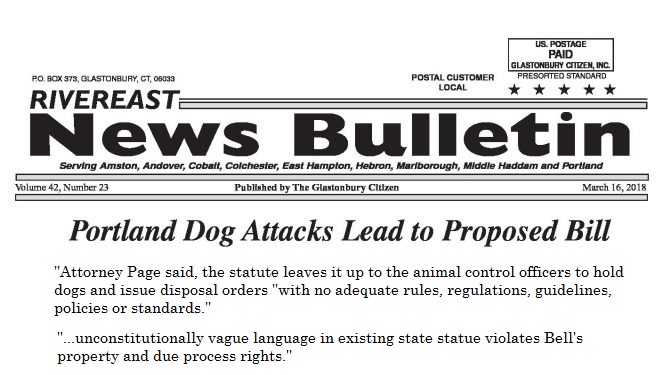Animal advocates challenge Connecticut’s dog death penalty

Court hears arguments on euthanization order for S. Hadley dog
October 9, 2017
Numerous states cracking down on fake service dogs
November 30, 2017This undated photo provided by Kim Miller, shows her dogs Kato and Kleo, who were taken from her in October 2012. A federal lawsuit argues the state violated the rights of dog owners like Miller by holding animals deemed dangerous for years on what amounts to a canine death row. There was a hearing Monday, July 10, 2017, in a lawsuit involving dogs from Waterbury, Manchester and Southington. (Kim Miller via AP)
By Pat Eaton-Robb
Associated Press,
HARTFORD, Conn. (AP) — A federal judge is being asked to decide whether Connecticut has violated the rights of dog owners by holding animals deemed dangerous for years on what amounts to a canine death row.
There was a hearing Monday in a lawsuit involving dogs from Waterbury, Manchester and Southington. But it seeks class-action status and an injunction that would prevent the destruction of any animal under a disposal order while the court decides if the state law is constitutional.
Kim Miller hopes it will lead to a reprieve for her dogs, Kato and Kleo, Rottweilers who have been held since being ordered destroyed in October 2012. Miller said the pair, who were 1 and 2 years old at the time, got out of her Hamden yard and bit a neighbor only after they were attacked with sticks and bats.
Attorney Thompson Page argued the state has no standards for determining when an animal should be euthanized, leaving it to the discretion of local animal control officers.
He argues that is a violation of due process and an unreasonable seizure of property.
Animal owners are given 14 days after a destruction order to ask for an appeal hearing before Animal Control Division of the state Department of Agriculture. The owner can seek additional appeals in court.
But Page said it can take months just to schedule a hearing and the process forces the owner to prove their animal did nothing wrong, rather than force the state to prove the animal deserves to die.
“In America, you are supposed to be innocent until proven guilty,” Miller said outside the courthouse. “When it comes to dogs, you are guilty until you can prove they are innocent.”
Steven Reviczky, the state’s agriculture commissioner, testified the appeals process actually required the towns prove by a preponderance of the evidence that the disposal order is necessary.
He said his department provides extensive training to animal control officers, but acknowledge there are no specific standards that need to be met to determine if an animal deserves to die. He said he often sees evidence such as pictures of a victim’s nose on the floor or chest torn open.
“I think the standard in most cases is common sense,” he said.
But Reviczky also acknowledged that neither he nor his hearing officers are attorneys and that he supports legislation that would shift the decision in life or death appeals to the courts.
A separate federal lawsuit on Kato and Kleo’s individual case was dismissed on Friday. But judge Thompson told Hamden’s attorney he expects the dogs won’t be euthanized at least for 10 days to give Page time to file a motion for an injunction.
He did not indicate when he might rule in the larger case, which seeks to include a class of about 50 dog owners, such as Miller.



